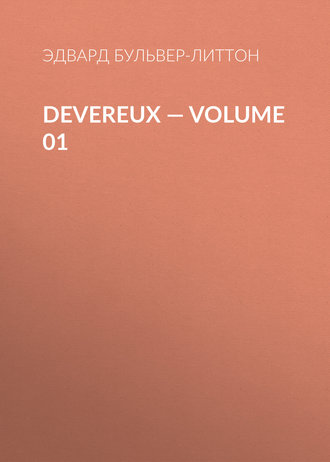
Эдвард Бульвер-Литтон
Devereux — Volume 01
CHAPTER X
A VERY SHORT CHAPTER,—CONTAINING A VALET
MY uncle for several weeks had flattered himself that I had quite forgotten or foregone the desire of leaving Devereux Court for London. Good easy man! he was not a little distressed when I renewed the subject with redoubled firmness, and demanded an early period for that event. He managed, however, still to protract the evil day. At one time it was impossible to part with me, because the house was so full; at another time it was cruel to leave him, when the house was so empty. Meanwhile, a new change came over me. As the first shock of Isora's departure passed away, I began to suspect the purity of her feelings towards me. Might not Gerald—the beautiful, the stately, the glittering Gerald—have been a successful wooer under the disguised name of Barnard, and /hence/ Isora's confusion when that name was mentioned, and hence the power which its possessor exercised over her?
This idea, once admitted, soon gained ground. It is true that Isora had testified something of favourable feelings towards me; but this might spring from coquetry or compassion. My love had been a boy's love, founded upon beauty and coloured by romance. I had not investigated the character of the object; and I had judged of the mind solely by the face. I might easily have been deceived: I persuaded myself that I was. Perhaps Gerald had provided their present retreat for sire and daughter; perhaps they at this moment laughed over my rivalry and my folly. Methought Gerald's lip wore a contemptuous curve when we met. "It shall have no cause," I said, stung to the soul; "I will indeed forget this woman, and yet, though in other ways, eclipse this rival. Pleasure, ambition, the brilliancy of a court, the resources of wealth, invite me to a thousand joys. I will not be deaf to the call. Meanwhile I will not betray to Gerald, to any one, the scar of the wound I have received; and I will mortify Gerald, by showing him that, handsome as he is, he shall be forgotten in my presence!"
Agreeably to this exquisite resolution, I paid incessant court to the numerous dames by whom my uncle's mansion was thronged; and I resolved to prepare, among them, the reputation for gallantry and for wit which I proposed to establish in town.
"You are greatly altered since your love," said Aubrey, one day to me, "but not by your love. Own that I did right in dissuading you from its indulgence!"
"Tell me!" said I, sinking my voice to a whisper, "do you think Gerald was my rival?" and I recounted the causes of my suspicion.
Aubrey's countenance testified astonishment as he listened. "It is strange, very strange," said he; "and the evidence of the boat is almost conclusive; still I do not think it quite sufficient to leave no loop-hole of doubt. But what matters it? you have conquered your love now."
"Ay," I said, with a laugh, "I have conquered it, and I am now about to find some other empress of the heart. What think you of the Lady Hasselton?—a fair dame and a sprightly. I want nothing but her love to be the most enviable of men, and a French /valet-de-chambre/ to be the most irresistible."
"The former is easier to obtain than the latter, I fear," returned Aubrey; "all places produce light dames, but the war makes a scarcity of French valets."
"True," said I, "but I never thought of instituting a comparison between their relative value. The Lady Hasselton, no disparagement to her merits, is but one woman; but a French valet who knows his /metier/ arms one for conquest over a thousand;" and I turned to the saloon.
Fate, which had destined to me the valuable affections of the Lady Hasselton, granted me also, at a yet earlier period, the greater boon of a French valet. About two or three weeks after this sapient communication with Aubrey, the most charming person in the world presented himself a candidate /pour le supreme bonheur de soigner Monsieur le Comte/. Intelligence beamed in his eye; a modest assurance reigned upon his brow; respect made his step vigilant as a zephyr's; and his ruffles were the envy of the world!
I took him at a glance; and I presented to the admiring inmates of the house a greater coxcomb than the Count Devereux in the ethereal person of Jean Desmarais.
CHAPTER XI
THE HERO ACQUITS HIMSELF HONOURABLY AS A COXCOMB.—A FINE LADY OF THE EIGHTEENTH CENTURY, AND A FASHIONABLE DIALOGUE; THE SUBSTANCE OF FASHIONABLE DIALOGUE BEING IN ALL CENTURIES THE SAME
"I AM thinking, Morton," said my uncle, "that if you are to go to town, you should go in a style suitable to your rank. What say you to flying along the road in my green and gold chariot? 'Sdeath! I'll make you a present of it. Nay—no thanks; and you may have four of my black Flanders mares to draw you."
"Now, my dear Sir William," cried Lady Hasselton, who, it may be remembered, was the daughter of one of King Charles's Beauties, and who alone shared the breakfast-room with my uncle and myself,—"now, my dear Sir William, I think it would be a better plan to suffer the Count to accompany us to town. We go next week. He shall have a seat in our coach, help Lovell to pay our post-horses, protect us at inns, scold at the drawers in the pretty oaths of the fashion, which are so innocent that I will teach them to his Countship myself; and unless I am much more frightful than my honoured mother, whose beauties you so gallantly laud, I think you will own, Sir William, that this is better for your nephew than doing solitary penance in your chariot of green and gold, with a handkerchief tied over his head to keep away cold, and with no more fanciful occupation than composing sonnets to the four Flanders mares."
"'Sdeath, Madam, you inherit your mother's wit as well as beauty," cried my uncle, with an impassioned air.
"And his Countship," said I, "will accept your invitation without asking his uncle's leave."
"Come, that is bold for a gentleman of—let me see, thirteen—are you not?"
"Really," answered I, "one learns to forget time so terribly in the presence of Lady Hasselton that I do not remember even how long it has existed for me."
"Bravo!" cried the knight, with a moistening eye; "you see, Madam, the boy has not lived with his old uncle for nothing."
"I am lost in astonishment!" said the lady, glancing towards the glass; "why, you will eclipse all our beaux at your first appearance; but—but—Sir William—how green those glasses have become! Bless me, there is something so contagious in the effects of the country that the very mirrors grow verdant. But—Count—Count—where are you, Count? [I was exactly opposite to the fair speaker.] Oh, there you are! Pray, do you carry a little pocket-glass of the true quality about you? But, of course you do; lend it me."
"I have not the glass you want, but I carry with me a mirror that reflects your features much more faithfully."
"How! I protest I do not understand you!"
"The mirror is here!" said I, laying my hand to my heart.
"'Gad, I must kiss the boy!" cried my uncle, starting up.
"I have sworn," said I, fixing my eyes upon the lady,—"I have sworn never to be kissed, even by women. You must pardon me, Uncle."
"I declare," cried the Lady Hasselton, flirting her fan, which was somewhat smaller than the screen that one puts into a great hall, in order to take off the discomfort of too large a room,—"I declare, Count, there is a vast deal of originality about you. But tell me, Sir William, where did your nephew acquire, at so early an age—eleven, you say, he is—such a fund of agreeable assurance?"
"Nay, Madam, let the boy answer for himself."
"/Imprimis/, then," said I, playing with the ribbon of my cane,—"/imprimis/, early study of the best authors,—Congreve and Farquhar, Etherege and Rochester; secondly, the constant intercourse of company which gives one the spleen so overpoweringly that despair inspires one with boldness—to get rid of them; thirdly, the personal example of Sir William Devereux; and, fourthly, the inspiration of hope."
"Hope, sir?" said the Lady Hasselton, covering her face with her fan, so as only to leave me a glimpse of the farthest patch upon her left cheek,—"hope, sir?"
"Yes, the hope of being pleasing to you. Suffer me to add that the hope has now become certainty."
"Upon my word, Count—"
"Nay, you cannot deny it; if one can once succeed in impudence, one is irresistible."
"Sir William," cried Lady Hasselton, "you may give the Count your chariot of green and gold, and your four Flanders mares, and send his mother's maid with him. He shall not go with me."
"Cruel! and why?" said I.
"You are too"—the lady paused, and looked at me over her fan. She was really very handsome—"you are too /old/, Count. You must be more than nine."
"Pardon me," said I, "I /am/ nine,—a very mystical number nine is too, and represents the Muses, who, you know, were always attendant upon Venus—or you, which is the same thing; so you can no more dispense with my company than you can with that of the Graces."
"Good morning, Sir William," cried the Lady Hasselton, rising.
I offered to hand her to the door; with great difficulty, for her hoop was of the very newest enormity of circumference; I effected this object. "Well, Count," said she, "I am glad to see you have brought so much learning from school; make the best use of it while it lasts, for your memory will not furnish you with a single simile out of the mythology by the end of next winter."
"That would be a pity," said I, "for I intend having as many goddesses as the heathens had, and I should like to worship them in a classical fashion."
"Oh, the young reprobate!" said the beauty, tapping me with her fan.
"And pray, what other deities besides Venus do I resemble?"
"All!" said I,—"at least, all the celestial ones!"
Though half way through the door, the beauty extricated her hoop, and drew back. "Bless me, the gods as well as the goddesses?"
"Certainly."
"You jest: tell me how."
"Nothing can be easier; you resemble Mercury because of your thefts."
"Thefts!"
"Ay; stolen hearts, and," added I, in a whisper, "glances; Jupiter, partly because of your lightning, which you lock up in the said glances,—principally because all things are subservient to you; Neptune, because you are as changeable as the seas; Vulcan, because you live among the flames you excite; and Mars, because—"
"You are so destructive," cried my uncle.
"Exactly so; and because," added I—as I shut the door upon the beauty—"because, thanks to your hoop, you cover nine acres of ground."
"Ods fish, Morton," said my uncle, "you surprise me at times: one while you are so reserved, at another so assured; to-day so brisk, to-morrow so gloomy. Why now, Lady Hasselton (she is very comely, eh! faith, but not comparable to her mother) told me, a week ago, that she, gave you up in despair, that you were dull, past hoping for; and now, 'Gad, you had a life in you that Sid himself could not have surpassed. How comes it, Sir, eh?"
"Why, Uncle, you have explained the reason; it was exactly because she said I was dull that I was resolved to convict her in an untruth."
"Well, now, there is some sense in that, boy; always contradict ill report by personal merit. But what think you of her ladyship? 'Gad, you know what old Bellair said of Emilia. 'Make much of her: she's one of the best of your acquaintance. I like her countenance and behaviour. Well, she has a modesty not i' this age, a-dad she has.' Applicable enough; eh, boy?"
"'I know her value, Sir, and esteem her accordingly,'" answered I, out of the same play, which by dint of long study I had got by heart. "But, to confess the truth," added I, "I think you might have left out the passage about her modesty."
"There, now; you young chaps are so censorious; why, 'sdeath, sir, you don't think the worse of her virtue because of her wit?"
"Humph!"
"Ah, boy! when you are my age, you'll know that your demure cats are not the best; and that reminds me of a little story; shall I tell it you, child?"
"If it so please you, Sir."
"Zauns—where's my snuff-box?—oh, here it is. Well, Sir, you shall have the whole thing, from beginning to end. Sedley and I were one day conversing together about women. Sid was a very deep fellow in that game: no passion you know; no love on his own side; nothing of the sort; all done by rule and compass; knew women as well as dice, and calculated the exact moment when his snares would catch them, according to the principles of geometry. D——d clever fellow, faith; but a confounded rascal: but let it go no further; mum's the word! must not slander the dead; and 'tis only my suspicion, you know, after all. Poor fellow: I don't think he was such a rascal; he gave a beggar an angel once,—well, boy, have a pinch?—Well, so I said to Sir Charles, 'I think you will lose the widow, after all,—'Gad I do.' 'Upon what principle of science, Sir William?' said he. 'Why, faith, man, she is so modest, you see, and has such a pretty way of blushing.' 'Hark ye, friend Devereux,' said Sir Charles, smoothing his collar and mincing his words musically, as he was wont to do,—'hark ye, friend Devereux, I will give you the whole experience of my life in one maxim: I can answer for its being new, and I think it is profound; and that maxim is—,' no, faith, Morton—no, I can't tell it thee: it is villanous, and then it's so desperately against all the sex."
"My dear uncle, don't tantalize me so: pray tell it me; it shall be a secret."
"No, boy, no: it will corrupt thee; besides, it will do poor Sid's memory no good. But, 'sdeath, it was a most wonderfully shrewd saying,—i' faith, it was. But, zounds, Morton, I forgot to tell you that I have had a letter from the Abbe to-day."
"Ha! and when does he return?"
"To-morrow, God willing!" said the knight, with a sigh.
"So soon, or rather after so long an absence! Well, I am glad of it. I wish much to see him before I leave you."
"Indeed!" quoth my uncle; "you have an advantage over me, then! But, ods fish, Morton, how is it that you grew so friendly with the priest before his departure? He used to speak very suspiciously of thee formerly; and, when I last saw him, he lauded thee to the skies."
"Why, the clergy of his faith have a habit of defending the strong and crushing the weak, I believe; that's all. He once thought I was dull enough to damn my fortune, and then he had some strange doubts for my soul; now he thinks me wise enough to become prosperous, and it is astonishing what a respect he has conceived for my principles."
"Ha! ha! ha!—you have a spice of your uncle's humour in you; and, 'Gad, you have no small knowledge of the world, considering you have seen so little of it."
A hit at the popish clergy was, in my good uncle's eyes, the exact acme of wit and wisdom. We are always clever with those who imagine we think as they do. To be shallow you must differ from people: to be profound you must agree with them. "Why, Sir," answered the sage nephew, "you forget that I have seen more of the world than many of twice my age. Your house has been full of company ever since I have been in it, and you set me to making observations on what I saw before I was thirteen. And then, too, if one is reading books about real life, at the very time one is mixing in it, it is astonishing how naturally one remarks and how well one remembers."
"Especially if one has a genius for it,—eh, boy? And then too, you have read my play; turned Horace's Satires into a lampoon upon the boys at school; been regularly to assizes during the vacation; attended the county balls, and been a most premature male coquette with the ladies. Ods fish, boy! it is quite curious to see how the young sparks of the present day get on with their lovemaking."
"Especially if one has a genius for it,—eh, sir?" said I.
"Besides, too," said my uncle, ironically, "you have had the Abbe's instructions."
"Ay, and if the priests would communicate to their pupils their experience in frailty, as well as in virtue, how wise they would make us!"
"Ods fish! Morton, you are quite oracular. How got you that fancy of priests?—by observation in life already?"
"No, Uncle: by observation in plays, which you tell me are the mirrors of life; you remember what Lee says,—
"''Tis thought
That earth is more obliged to priests for bodies
Than Heaven for souls.'"
And my uncle laughed, and called me a smart fellow.
CHAPTER XII
THE ABBE'S RETURN.—A SWORD, AND A SOLILOQUY
THE next evening, when I was sitting alone in my room, the Abbe Montreuil suddenly entered. "Ah, is it you? welcome!" cried I. The priest held out his arms, and embraced me in the most paternal manner.
"It is your friend," said he, "returned at last to bless and congratulate you. Behold my success in your service," and the Abbe produced a long leather case richly inlaid with gold.
"Faith, Abbe," said I, "am I to understand that this is a present for your eldest pupil?"
"You are," said Montreuil, opening the case, and producing a sword. The light fell upon the hilt, and I drew back, dazzled with its lustre; it was covered with stones, apparently of the most costly value. Attached to the hilt was a label of purple velvet, on which, in letters of gold, was inscribed, "To the son of Marshal Devereux, the soldier of France, and the friend of Louis XIV."
Before I recovered my surprise at this sight, the Abbe said: "It was from the King's own hand that I received this sword, and I have authority to inform you that if ever you wield it in the service of France it will be accompanied by a post worthy of your name."
"The service of France!" I repeated; "why, at present that is the service of an enemy."
"An enemy only to a /part/ of England!" said the Abbe, emphatically; "perhaps I have overtures to you from other monarchs, and the friendship of the court of France may be synonymous with the friendship of the true sovereign of England."
There was no mistaking the purport of this speech, and even in the midst of my gratified vanity I drew back alarmed.
The Abbe noted the changed expression of my countenance, and artfully turned the subject to comments on the sword, on which I still gazed with a lover's ardour. Thence he veered to a description of the grace and greatness of the royal donor: he dwelt at length upon the flattering terms in which Louis had spoken of my father, and had inquired concerning myself; he enumerated all the hopes that the illustrious house into which my father had first married expressed for a speedy introduction to his son; he lingered with an eloquence more savouring of the court than of the cloister on the dazzling circle which surrounded the French throne; and when my vanity, my curiosity, my love of pleasure, my ambition, all that are most susceptible in young minds, were fully aroused, he suddenly ceased, and wished me a good night.
"Stay," said I; and looking at him more attentively than I had hitherto done, I perceived a change in his external appearance which somewhat startled and surprised me. Montreuil had always hitherto been remarkably plain in his dress; but he was now richly attired, and by his side hung a rapier, which had never adorned it before. Something in his aspect seemed to suit the alteration in his garb: and whether it was that long absence had effaced enough of the familiarity of his features to allow me to be more alive than formerly to the real impression they were calculated to produce, or whether a commune with kings and nobles had of late dignified their old expression, as power was said to have clothed the soldier-mien of Cromwell with a monarch's bearing,—I do not affect to decide; but I thought that, in his high brow and Roman features, the compression of his lip, and his calm but haughty air, there was a nobleness, which I acknowledged for the first time. "Stay, my father," said I, surveying him, "and tell me, if there be no irreverence in the question, whether brocade and a sword are compatible with the laws of the Order of Jesus?"
"Policy, Morton," answered Montreuil, "often dispenses with custom; and the declarations of the Institute provide, with their usual wisdom, for worldly and temporary occasions. Even while the constitution ordains us to discard habits repugnant to our professions of poverty, the following exception is made: 'Si in occurrenti aliqua occasione, vel necessitate, quis vestibus melioribus, honestis tamen, indueretur.'"3
"There is now, then, some occasion for a more glittering display than ordinary?" said I.
"There is, my pupil," answered Montreuil; "and whenever you embrace the offer of my friendship made to you more than two years ago,—whenever, too, your ambition points to a lofty and sublime career,—whenever to make and unmake kings, and in the noblest sphere to execute the will of God, indemnifies you for a sacrifice of petty wishes and momentary passions,—I will confide to you schemes worthy of your ancestors and yourself."
With this the priest departed. Left to myself, I revolved his hints, and marvelled at the power he seemed to possess. "Closeted with kings," said I, soliloquizing,—"bearing their presents through armed men and military espionage; speaking of empires and their overthrow as of ordinary objects of ambition; and he himself a low-born and undignified priest, of a poor though a wise order,—well, there is more in this than I can fathom: but I will hesitate before I embark in his dangerous and concealed intrigues; above all, I will look well ere I hazard my safe heritage of these broad lands in the service of that House which is reported to be ungrateful, and which is certainly exiled."
After this prudent and notable resolution, I took up the sword, re-examined it, kissed the hilt once and the blade twice, put it under my pillow, sent for my valet, undressed, went to bed, fell asleep, and dreamed that I was teaching the Marechal de Villars the thrust /en seconde/.
But Fate, that arch-gossip, who, like her prototypes on earth, settles all our affairs for us without our knowledge of the matter, had decreed that my friendship with the Abbe Montreuil should be of very short continuance, and that my adventures on earth should flow through a different channel than, in all probability, they would have done under his spiritual direction.






